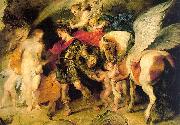
Oil On
Canvas, Real Flavor of Old Masters
|
Peter Paul Rubens
|
|||
|
|
|||
| Flemish Baroque Era Painter, 1577-1640 Peter Paul Rubens (June 28, 1577 ?C May 30, 1640) was a prolific seventeenth-century Flemish Baroque painter, and a proponent of an exuberant Baroque style that emphasized movement, color, and sensuality. He is well-known for his Counter-Reformation altarpieces, portraits, landscapes, and history paintings of mythological and allegorical subjects. In addition to running a large studio in Antwerp which produced paintings popular with nobility and art collectors throughout Europe, Rubens was a classically-educated humanist scholar, art collector, and diplomat who was knighted by both Philip IV, king of Spain, and Charles I, king of England. Rubens was a prolific artist. His commissioned works were mostly religious subjects, "history" paintings, which included mythological subjects, and hunt scenes. He painted portraits, especially of friends, and self-portraits, and in later life painted several landscapes. Rubens designed tapestries and prints, as well as his own house. He also oversaw the ephemeral decorations of the Joyous Entry into Antwerp by the Cardinal-Infante Ferdinand in 1635. His drawings are mostly extremely forceful but not detailed; he also made great use of oil sketches as preparatory studies. He was one of the last major artists to make consistent use of wooden panels as a support medium, even for very large works, but he used canvas as well, especially when the work needed to be sent a long distance. For altarpieces he sometimes painted on slate to reduce reflection problems. His fondness of painting full-figured women gave rise to the terms 'Rubensian' or 'Rubenesque' for plus-sized women. The term 'Rubensiaans' is also commonly used in Dutch to denote such women. | |||
|
|
|||
|
|
Perseus Liberating Andromeda Peter Paul Rubens35.jpg Painting ID:: 3675 Visit European Gallery |
1620's The Hermitage, St.Petersburg | |
Height Width |
INS/CM |
||
|
X |
|
||
|
|
|||
|
Piero di Cosimo
|
|||
|
|
|||
| 1462-1521 Italian Piero di Cosimo Galleries Italian painter and draughtsman. Tax declarations made by Piero di Cosimo's father suggest that the artist was born in either 1461 or 1462. According to the first, he was eight years old in 1469, while a catasto (land registry declaration) of 1480 gives his age as 18. A document of 1457 establishes that his father, Lorenzo di Piero d'Antonio, was a maker of small tools (succhiellinaio) rather than a goldsmith, as Vasari claimed. By 1480 Piero appears no longer to have been living at the family house in the Via della Scala, Florence, but was an unsalaried apprentice or workshop assistant to Cosimo Rosselli, from whom he received room and board and eventually took the name of Piero di Cosimo. | |||
|
|
|||
|
|
Perseus Liberating Andromeda new16/Piero di Cosimo-942243.jpg Painting ID:: 44890 Visit European Gallery |
mk176 c.1510 65.4x183.5 | |
Height Width |
INS/CM |
||
|
X |
|
||
|
|
|||
|
RUBENS, Pieter Pauwel
|
|||
|
|
|||
| Flemish Baroque Era Painter, 1577-1640 | |||
|
|
|||
|
|
Perseus Liberating Andromeda new22/RUBENS, Pieter Pauwel-659522.jpg Painting ID:: 64710 Visit European Gallery |
1639-40 Oil on canvas, 265 x 160 cm Museo del Prado, Madrid This is a late work of Rubens. The unfinished painting was finished by Jacob Jordaens. Artist:RUBENS, Pieter Pauwel Title: Perseus Liberating Andromeda, 1601-1650, Flemish , painting , mythological | |
Height Width |
INS/CM |
||
|
X |
|
||
|
|
|||
|
Maffei, Francesco
|
|||
|
|
|||
| Italian Baroque Era Painter, 1605-1660 Italian painter. He probably trained with his father, Giacomo Maffei, before joining the workshop of the Maganza family in Vicenza. His early works, such as the Ecce homo (ex-Dianin priv. col., Padua, see Pallucchini, 1981,), were influenced by the eclectic style, between Veronese and the Bassani, of Alessandro Maganza. The St Nicholas and the Angel (1626; Vicenza, S Nicola da Tolentino), with colours like those of Veronese, yet lighter, suggests Maffei's rapid development of an independent style that is both rugged and moving. His interest in narrative, already evident in scenes from the Life of St Cajetan (Vicenza, S Stefano), was developed in the later Martyrdom of the Franciscan Minors at Nagasaki (Schio, S Francesco), which is datable to about 1630. Here, the contrast between the pale, silvery tones of the background and the darker foreground figures is derived from Tintoretto, but the exaggerated Mannerist treatment of the main figures also recalls the art of such French engravers as Jacques Bellange and Pierre Brebiette. At the same time there is also an echo of the extreme stylizations of Giovanni Demio. | |||
|
|
|||
|
|
Perseus Liberating Andromeda new26/Maffei, Francesco-774354.jpg Painting ID:: 95803 Visit European Gallery |
between 1657(1657) and 1658(1658) Medium oil on canvas cyf | |
Height Width |
INS/CM |
||
|
X |
|
||
|
|
|||










